History has a habit of repeating itself. "Dream win for Kenny - Nightmare for Fianna Fáil".
The headline over Tom Courell's front-page story in the Western People in November 1975 was just as apt 36 years later, when Enda Kenny led Fine Gael to its most famous victory.
For the early part of his political career, few - if any - would have predicted events would take such a turn, writes Western Correspondent Pat McGrath.
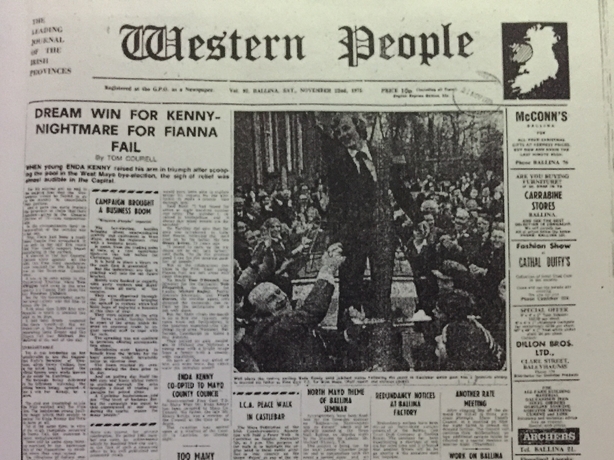
A stereotypical backbencher for most of the first half of his Dáil life, he went on to serve as Minister for Tourism and Trade in the mid 1990s, before surprising many in 2001, when he indicated he wanted to lead his party.
Already the longest-serving TD in the Dáil, Kenny is standing in his 13th national contest this year.
Since he took the seat vacated following the death of his father in 1975, the Taoiseach has held it in every election since. But sometimes, only just. In 2002, he was a whisker away from losing out, until transfers from eliminated party colleague Jim Higgins allowed him live to fight another day.
That rub of the relic has typified his political ascent.
Kenny is a lucky general. He was lucky not to succeed John Bruton as party leader in the 2001 contest. He stood back and watched Michael Noonan preside over a catastrophe the following year, before succeeding him.
Five years later, he was lucky to lose the 2007 election. It mightn't have seemed so at the time, but the economy began to implode soon afterwards.
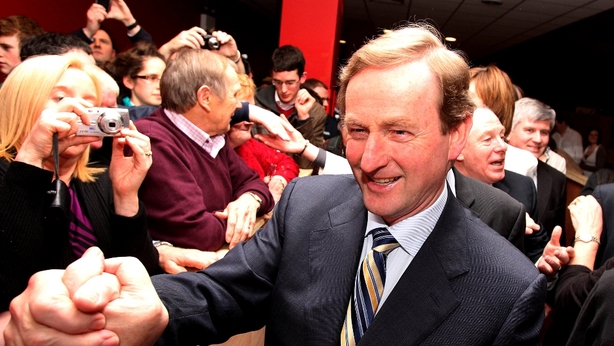 For a sizeable chunk of voters, by the time the 2011 decider rolled around, Kenny fitted the bill as an alternative, after 14 years of Fianna Fáil-led administrations.
For a sizeable chunk of voters, by the time the 2011 decider rolled around, Kenny fitted the bill as an alternative, after 14 years of Fianna Fáil-led administrations.
Now, opinion polls and the fractured nature of the Opposition suggest that lucky streak may extend to him becoming the first Fine Gael Taoiseach to retain power, when the dust settles on the 2016 poll.
And still, he divides opinion, inside his party and across the country.
A lot of the time, it seems like there are two Enda Kennys. In carefully managed media appearances, you can almost see the wheels whirring as he regurgitates "key messages", themselves the result of endless focus groups and strategy meetings.
Here, the Fine Gael leader can often come across as mechanical, trotting out sound-bites that seem to have been drilled into him in the hours preceding an interview or debate.
It's something that even his closest supporters despair of, especially when he can be such a different proposition in other circumstances.
Unencumbered by strategic strictures, when he speaks off the cuff at meetings or to voters on the street, he displays empathy, understanding and a human side that can unnerve the staunchest opponents.
He's the consummate political operator too, nowhere more so than in Mayo.
While he's been attending to affairs of State for the past five years, he's stayed in close touch with his constituency.
He's unlikely to reach the dizzy heights of the almost 17,500 first preferences he secured in 2011 but he's worked the beat across his patch assiduously since then.
Most Mondays involve a hectic round of local engagements, ribbon cuttings, school visits, speaking appointments and clinics.
These things matter but other things matter more. Critics in his home county point to an absence of big announcements regarding jobs or significant investment there during his time in office.
He says the slings and arrows of recent years don't impact on him personally and that they come with the territory. But for a significant chunk of his tenure as Taoiseach, Kenny has been in the eye of a storm of protest.
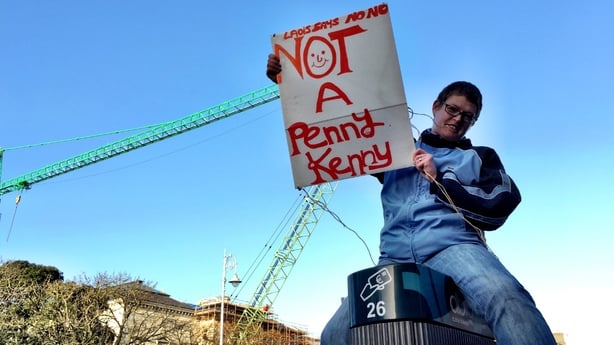
This was particularly the case during the extensive water charge demonstrations.
Tight security was routine at most public engagements and he felt the full brunt of anger from those opposed to water bills.
Those demonstrations also showed the changed dispensation for a politician since the time Kenny cut his teeth in the game, in the mid 1970s. The age of deference has given way to one of defiance.
In contrast to the mixed response his term in office was met with at home, Kenny has had a smoother ride on the global stage.
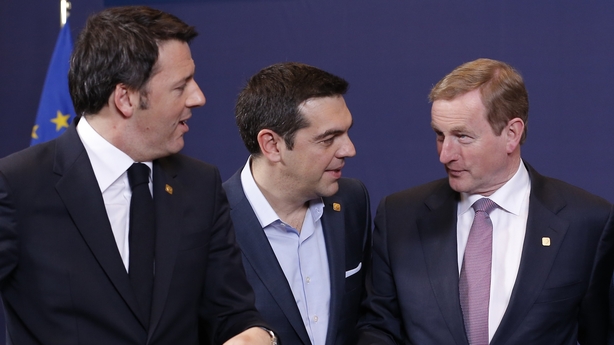 Even his detractors point to his international standing as Taoiseach and the job he has done in promoting inward investment.
Even his detractors point to his international standing as Taoiseach and the job he has done in promoting inward investment.
There are plenty of regional criticisms about the manner and spread of such investment but the Fine Gael leader has played a part in raising the country's profile.
He's said to "get" the role he can play in attracting companies to Ireland and his tendency not to stand on ceremony is a key factor in putting business leaders at ease.
One source says he's effectively translated the approach of a rural politician in a constituency setting and upscaled it to apply to the world of international business dealings. This creates "huge good will" towards Ireland.
Of course, striving to make Ireland the "best small country in which to do business" won't butter parsnips for thousands of people who've had to emigrate in recent years.
And it does little to enhance the lot of those in towns struggling to survive in the face of shop closures, service withdrawals and broadband speeds that should belong to a bygone age.
Politically, the Taoiseach has shown determination as leader, especially when it came to the enactment of the Protection of Life During Pregnancy Bill.
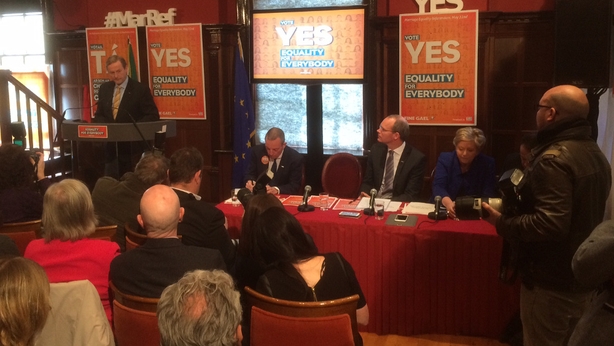
His ability to bring people with him was evident too when it came to the same sex-marriage referendum.
In both instances, his sure-footedness yielded dividends.
But there have been missteps too, like the Irish Water debacle and the Seanad abolition referendum.
If there's a constant with Kenny in office, it's an expectation of loyalty.
He demands it from all those close to him and is unyielding in the event that he perceives it to have been compromised.
A number of TDs to fall foul of his reign during the last Dáil term are in no doubt as to the certainty with which he administers his punishment.
It's absolute, cold and calculated. You're either with Kenny or against him. And when you're out, you're out.
"There's no redemption when you're in that boat ... he takes things personally, even if the 'betrayal' is far from such" says one of those no longer in favour.
But he's pragmatic too and he picks his battles. He brought many of those who backed Richard Bruton in a leadership heave in 2010 into Cabinet. While outward bonhomie may mask latent tensions, all sides at least give the appearance of working well together.
Still, there are observers who say this is the ultimate canniness and that memories of betrayal still pertain.
All of that is immaterial for the next few weeks, when the only focus is on returning Fine Gael to power and in the process, holding as many seats as possible across the country.
We've already seen several hints that "message discipline" will be central to the party's campaign.
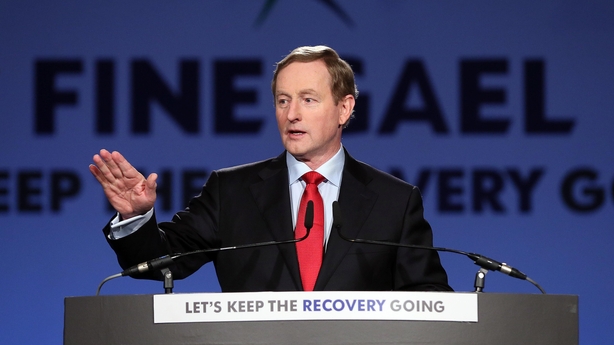 For his third General Election at the helm, Kenny has a three-step mantra for voters to chew on. Covering jobs, work and services, it's neatly bundled in this "keep the recovery going" catchphrase.
For his third General Election at the helm, Kenny has a three-step mantra for voters to chew on. Covering jobs, work and services, it's neatly bundled in this "keep the recovery going" catchphrase.
There's precedent for this approach. Last time round it was a five-point plan, while in 2007 he invited us to "sign the contract for a better Ireland".
Whether this is simplifying political discourse or a sign of the times is another question.
There's no doubt that Fine Gael and Kenny go into this campaign with momentum.
He's the overwhelming favourite with bookies to be the next Taoiseach and there's consensus among political analysts that the party will be the largest in the next Dáil.
It's been a long road since that November afternoon over 40 years ago, when he saw off the Fianna Fáil challenge in the old Mayo West constituency.
Many laughed when Kenny pledged to "electrify" Fine Gael in early 2001. But now, on the cusp of being returned to government for a second term, maybe he has succeeded in doing exactly that.
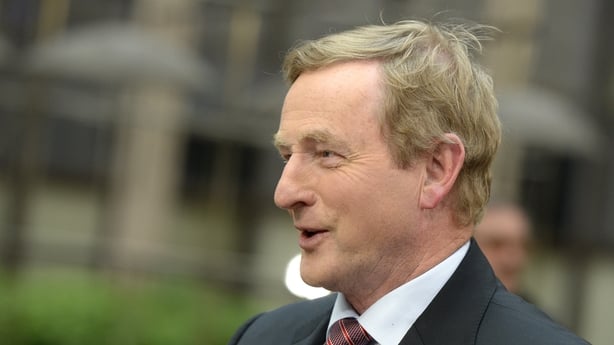 Who's laughing now?
Who's laughing now?
The next few weeks will tell.
